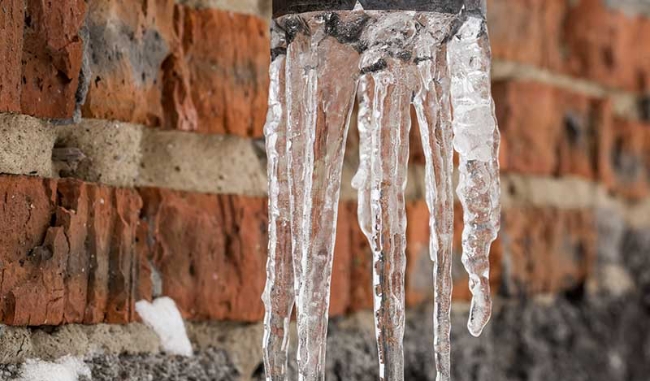We have noticed this post on Preventing and dealing with frozen pipes listed below on the net and thought it made good sense to share it with you on this page.

Cold weather can wreak havoc on your plumbing, particularly by freezing pipelines. Right here's exactly how to prevent it from happening and what to do if it does.
Intro
As temperature levels drop, the risk of icy pipelines boosts, possibly bring about expensive repairs and water damages. Comprehending just how to prevent icy pipelines is important for homeowners in chilly environments.
Prevention Tips
Protecting at risk pipes
Cover pipelines in insulation sleeves or utilize warmth tape to safeguard them from freezing temperature levels. Concentrate on pipes in unheated or exterior areas of the home.
Heating methods
Maintain interior spaces effectively warmed, especially locations with plumbing. Open up closet doors to permit cozy air to distribute around pipes under sinks.
How to identify icy pipelines
Seek lowered water circulation from faucets, uncommon odors or noises from pipelines, and noticeable frost on subjected pipes.
Long-Term Solutions
Architectural changes
Think about rerouting pipelines far from outside walls or unheated areas. Include additional insulation to attic rooms, basements, and crawl spaces.
Updating insulation
Purchase premium insulation for pipelines, attics, and walls. Correct insulation assists keep regular temperatures and minimizes the threat of icy pipelines.
Protecting Outdoor Plumbing
Yard hose pipes and outdoor taps
Detach and drain pipes yard pipes before wintertime. Set up frost-proof spigots or cover exterior taps with protected caps.
Understanding Frozen Pipes
What triggers pipelines to ice up?
Pipes ice up when subjected to temperatures listed below 32 ° F (0 ° C) for prolonged durations. As water inside the pipelines freezes, it expands, taxing the pipeline wall surfaces and potentially creating them to break.
Dangers and damages
Icy pipes can bring about water supply disturbances, residential or commercial property damages, and costly repair work. Burst pipes can flooding homes and cause comprehensive architectural damage.
Signs of Frozen Piping
Recognizing frozen pipes early can stop them from bursting.
What to Do If Your Pipelines Freeze
Immediate activities to take
If you suspect icy pipelines, maintain taps open to relieve pressure as the ice melts. Make use of a hairdryer or towels taken in warm water to thaw pipelines gradually.
Final thought
Stopping frozen pipes calls for aggressive actions and quick reactions. By comprehending the causes, signs, and safety nets, homeowners can shield their pipes during winter.
Helpful Tips to Prevent Frozen Pipes this Winter
UNDERSTANDING THE BASICS: WHY PIPES FREEZE AND WHY IT’S A PROBLEM
Water freezing inside pipes is common during the winter months, but understanding why pipes freeze, and the potential problems it can cause is crucial in preventing such incidents. This section will delve into the basics of why pipes freeze and the associated problems that may arise.
THE SCIENCE BEHIND FROZEN PIPES
When water reaches freezing temperatures, it undergoes a physical transformation and solidifies into ice. This expansion of water as it freezes is the primary reason pipes can burst. As the water inside the pipe freezes, it expands, creating immense pressure on the walls. If the pressure becomes too great, the pipe can crack or rupture, leading to leaks and water damage.
FACTORS THAT CONTRIBUTE TO PIPE FREEZING
Low Temperatures: Extremely cold weather, especially below freezing, increases the risk of pipes freezing. Uninsulated or Poorly Insulated Pipes: Pipes located in unheated areas, such as basements, crawl spaces, or attics, are more prone to freezing. Insufficient insulation or lack of insulation altogether exacerbates the problem. Exterior Wall Exposure: Pipes running along exterior walls are susceptible to freezing as they encounter colder temperatures outside. Lack of Heating or Temperature Regulation: Inadequate heating or inconsistent temperature control in your home can contribute to frozen pipes. PROBLEMS CAUSED BY FROZEN PIPES
- Pipe Bursting: As mentioned earlier, the expansion of water as it freezes can cause pipes to burst, resulting in significant water damage.
- Water Damage: When pipes burst, it can lead to flooding and water damage to your property, including walls, ceilings, flooring, and personal belongings.
- Structural Damage: Prolonged exposure to water from burst pipes can compromise the structural integrity of your home, leading to costly repairs.
- Mold and Mildew Growth: Excess moisture from water damage can create a favorable environment for mold and mildew growth, posing health risks to occupants.
- Disrupted Water Supply: Frozen pipes can also result in a complete or partial loss of water supply until the issue is resolved.
WHY CERTAIN PIPES ARE MORE PRONE TO FREEZING
- Location: Pipes located in unheated or poorly insulated areas, such as basements, crawl spaces, attics, or exterior walls, are at higher risk of freezing.
- Exterior Pipes: Outdoor pipes, such as those used for irrigation or exposed plumbing, are particularly vulnerable to freezing as they are directly exposed to the elements.
- Supply Lines: Pipes that carry water from the main water supply into your home, including the main water line, are critical to protect as freezing in these lines can affect your entire plumbing system.
- Underground Pipes: Pipes buried underground, such as those connected to sprinkler systems or outdoor faucets, can be susceptible to freezing if not properly insulated.
https://busybusy.com/blog/helpful-tips-to-prevent-frozen-pipes-this-winter/

We were brought to that report on Winter Plumbing Precautions: Preventing Frozen Pipes through a good friend on another web blog. You should take the opportunity to promote this page if you enjoyed reading it. I am grateful for your time. Come back soon.
Go Company